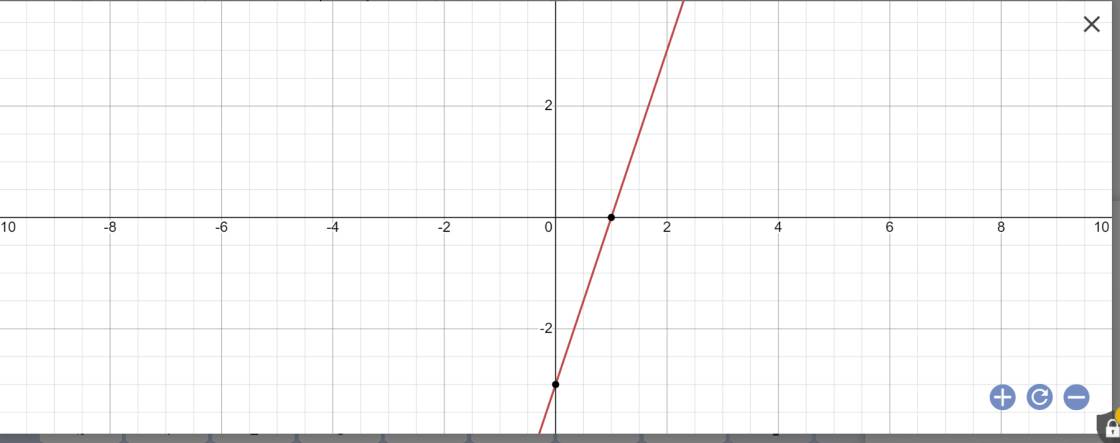
Hãy nhập câu hỏi của bạn vào đây, nếu là tài khoản VIP, bạn sẽ được ưu tiên trả lời.


Câu 5:
a: Khi m=3 thì \(f\left(x\right)=\left(2\cdot3+1\right)x-3=7x-3\)
\(f\left(-3\right)=7\cdot\left(-3\right)-3=-21-3=-24\)
\(f\left(0\right)=7\cdot0-3=-3\)
b: Thay x=2 và y=3 vào f(x)=(2m+1)x-3, ta được:
\(2\left(2m+1\right)-3=3\)
=>2(2m+1)=6
=>2m+1=3
=>2m=2
=>m=1
c: Thay m=1 vào hàm số, ta được:
\(y=\left(2\cdot1+1\right)x-3=3x-3\)
*Vẽ đồ thị

d: Để hàm số y=(2m+1)x-3 là hàm số bậc nhất thì \(2m+1\ne0\)
=>\(2m\ne-1\)
=>\(m\ne-\dfrac{1}{2}\)
e: Để đồ thị hàm số y=(2m+1)x-3 song song với đường thẳng y=5x+1 thì \(\left\{{}\begin{matrix}2m+1=5\\-3\ne1\end{matrix}\right.\)
=>2m+1=5
=>2m=4
=>m=2

1. Đề bài sai, các biểu thức này chỉ có giá trị lớn nhất, không có giá trị nhỏ nhất
2.
\(A=\left(2x\right)^3-3^3-\left(8x^3+2\right)\)
\(=8x^3-27-8x^3-2\)
\(=-29\)
\(B=x^3+9x^2+27x+27-\left(x^3+9x^2+27x+243\right)\)
\(=27-243=-216\)
sửa đề lại thành tìm Max nhé1, vì mấy ý này ko có min
\(1,=>D=-\left(x^2-4x-3\right)=-\left(x^2-2.2x+4-7\right)\)
\(=-[\left(x-2\right)^2-7]=-\left(x-2\right)^2+7\le7\)
dấu"=" xảy ra<=>x=2
2, \(E=-2\left(x^2-x+\dfrac{5}{2}\right)=-2[x^2-2.\dfrac{1}{2}x+\dfrac{1}{4}+\dfrac{9}{4}]\)
\(=-2[\left(x-\dfrac{1}{2}\right)^2+\dfrac{9}{4}]\le-\dfrac{9}{2}\) dấu"=" xảy ra<=>x=1/2
3, \(F=-\left(x^2+4x-20\right)=-\left(x^2+2.2x+4-24\right)\)
\(=-[\left(x+2\right)^2-24]\le24\) dấu"=" xảy ra<=>x=-2

`a) x(x + 5)(x – 5) – (x + 2)(x^2 – 2x + 4) = 3`
`<=>x(x^2-25)-(x^3-8)=3`
`<=>x^3-25x-x^3+8=3`
`<=>-25x=-5`
`<=>x=1/5`
`b) (x – 3)^3 – (x – 3)(x^2 + 3x + 9) + 9(x + 1)^2 = 15`
`<=>x^3-9x^2+27x-27-(x^3-27)+9(x^2+2x+1)=15`
`<=>-9x^2+27x+9x^2+18x+9=15`
`<=>45x+9=15`
`<=>45x=6`
`<=>x=6/45=2/15`
`c) (x+5)(x^2 –5x +25) – (x – 7) = x^3`
`<=>x^3-125-x+7=x^3`
`<=>x^3-x-118=x^3`
`<=>-x-118=0`
`<=>-x=118<=>x=-118`
`d) (x+2)(x^2 – 2x + 4) – x(x^2 + 2) = 4 `
`<=>x^3+8-x^3-2x=4`
`<=>8-2x=4`
`<=>2x=4<=>x=2`

a) Rút gọn VT = 45x + 8. Từ đó tìm được x = 2 15 .
b) Rút gọn VT = -25x – 8. Từ đó tìm được x = − 11 25 .

Lời giải:
a. $x(3x+1)+(x-1)^2-(2x+1)(2x-1)=0$
$\Leftrightarrow (3x^2+x)+(x^2-2x+1)-(4x^2-1)=0$
$\Leftrightarrow 3x^2+x+x^2-2x+1-4x^2+1=0$
$\Leftrightarrow (3x^2+x^2-4x^2)+(x-2x)+(1+1)=0$
$\Leftrightarrow -x+2=0$
$\Leftrightarrow x=2$
b.
$(x+1)^3+(2-x)^3-9(x-3)(x+3)=0$
$\Leftrightarrow [(x+1)+(2-x)][(x+1)^2-(x+1)(2-x)+(2-x)^2]-9(x-3)(x+3)=0$
$\Leftrightarrow 3[x^2+2x+1-(x-x^2+2)+(x^2-4x+4)]-9(x-3)(x+3)=0$
$\Leftrightarrow 3(3x^2-3x+3)-9(x^2-9)=0$
$\Leftrightarrow 9(x^2-x+1)-9(x^2-9)=0$
$\Leftrightarrow 9(x^2-x+1-x^2+9)=0$
$\Leftrightarrow 9(-x+10)=0$
$\Leftrightarrow -x+10=0\Leftrightarrow x=10$
c.
$(x-1)^3-(x+3)(x^2-3x+9)+3x^2=25$
$\Leftrightarrow (x^3-3x^2+3x-1)-(x^3+3^3)+3x^2=25$
$\Leftrightarrow x^3-3x^2+3x-1-x^3-27+3x^2=25$
$\Leftrightarrow (x^3-x^3)+(-3x^2+3x^2)+3x-28=25$
$\Leftrightarrow 3x-28=25$
$\Leftrightarrow x=\frac{53}{3}$
d.
$(x+2)^3-(x+1)(x^2-x+1)-6(x-1)^2=23$
$\Leftrightarrow (x^3+6x^2+12x+8)-(x^3+1)-6(x^2-2x+1)=23$
$\Leftrightarrow x^3+6x^2+12x+8-x^3-1-6x^2+12x-6=23$
$\Leftrightarrow (x^3-x^3)+(6x^2-6x^2)+(12x+12x)+(8-1-6)=23$
$\Leftrightarrow 24x+1=23$
$\Leftrgihtarrow 24x=22$
$\Leftrightarrow x=\frac{11}{12}$

a: Ta có: \(\left(x-3\right)^3-\left(x-3\right)\left(x^2+3x+9\right)+6\left(x+1\right)^2+3x^2=-33\)
\(\Leftrightarrow x^3-9x^2+27x-27-x^3+27+6x^2+12x+1+3x^2=-33\)
\(\Leftrightarrow39x=-34\)
hay \(x=-\dfrac{34}{39}\)
b: Ta có: \(\left(x-3\right)\left(x^2+3x+9\right)-x\left(x-2\right)\left(x+2\right)=1\)
\(\Leftrightarrow x^3-27-x^3+4x=1\)
\(\Leftrightarrow4x=28\)
hay x=7
c: Ta có: \(\left(x+2\right)\left(x^2-2x+4\right)-x\left(x-3\right)\left(x+3\right)=26\)
\(\Leftrightarrow x^3+8-x^3+9x=26\)
\(\Leftrightarrow x=2\)

B = 2\(x^2\) - 4\(x\) - 8
B = 2(\(x^2\) - 2\(x\) + 4) - 16
B = 2(\(x-2\))2 - 16
Vì (\(x-2\))2 ≥ 0 ∀ \(x\) ⇒ 2(\(x-2\))2 ≥ 0 ∀ \(x\)
⇒ 2(\(x-2\))2 - 16 ≥ -16 ∀ \(x\)
Dấu bằng xảy ra khi (\(x-2\))2 = 0 ⇒ \(x-2=0\) ⇒ \(x=2\)
Vậy Bmin = -16 khi \(x=2\)
Tìm min của C biết:
C = \(x^2\) - 2\(xy\) + 2y2 + 2\(x\) - 10y + 17
C = (\(x^2\) - 2\(xy\) + y2) + 2(\(x\) - y) + y2 - 8y + 16 + 1
C = (\(x\) - y)2 + 2(\(x\) - y) + 1 + (y2 - 8y + 16)
C = (\(x-y+1\))2 + (y - 4)2
Vì (\(x\) - y + 1)2 ≥ 0 ∀ \(x;y\); (y - 4)2 ≥ 0 ∀ y
Dấu bằng xảy ra khi: \(\left\{{}\begin{matrix}x-y+1=0\\y-4=0\end{matrix}\right.\) ⇒ \(\left\{{}\begin{matrix}x-y+1=0\\y=4\end{matrix}\right.\)
⇒ \(\left\{{}\begin{matrix}x-4+1=0\\y=4\end{matrix}\right.\) ⇒ \(\left\{{}\begin{matrix}x=-1+4\\y=4\end{matrix}\right.\) ⇒ \(\left\{{}\begin{matrix}x=3\\y=4\end{matrix}\right.\)
Vậy Cmin = 0 khi (\(x;y\)) = (3; 4)
giúp mk vs


lên mạng mà tra là ra mà